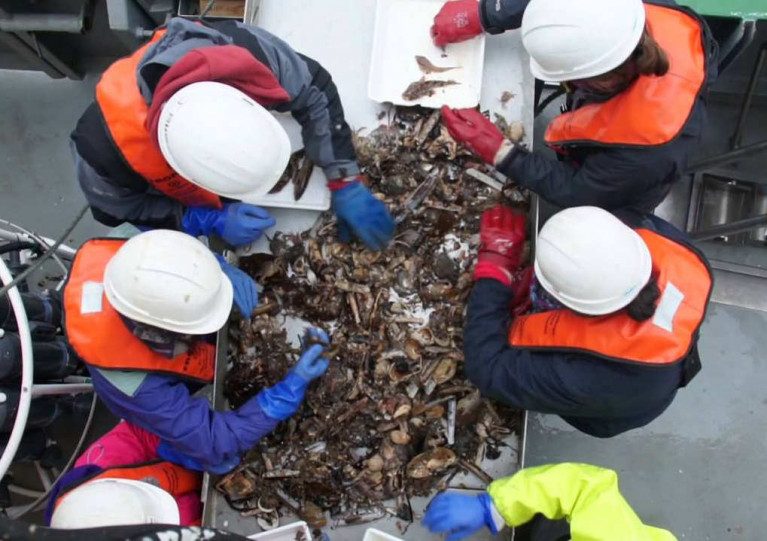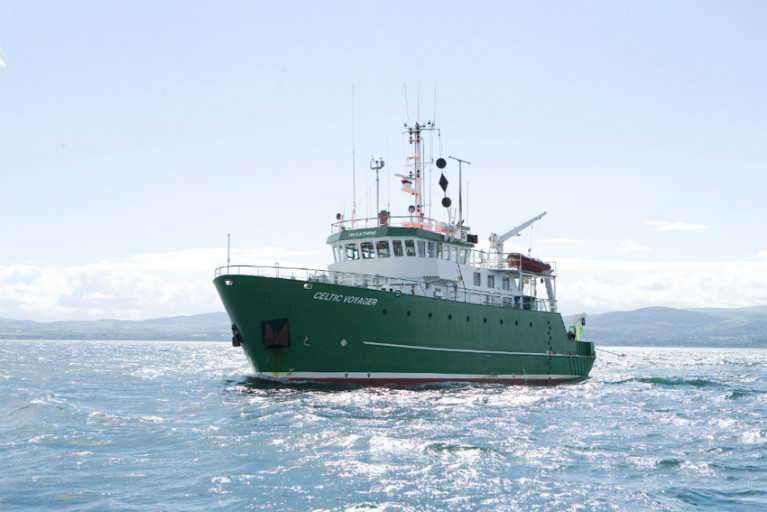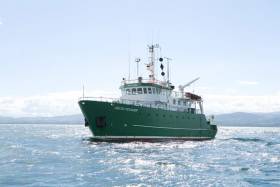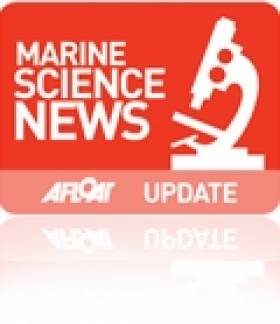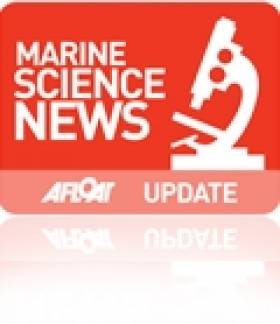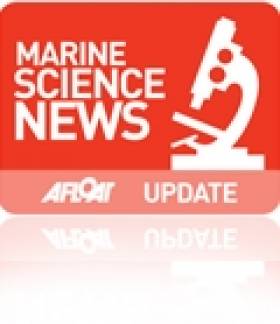Displaying items by tag: SMART
Up to 20 Bursaries Offered in Marine Institute & SMART Research Vessel Call for 2021
The call is now open for Marine Institute SMART Research Vessel Bursaries 2021 — but applicants must act fast, as the closing date for the first survey is this coming Tuesday 2 February.
This year up to 20 bursaries are being offered on dedicated FEAS surveys, where successful applicants for the Student at Sea Bursary (fixed at €95 per survey night) will be mentored by experienced marine scientists and research leaders as they develop core offshore data collection skills.
As with last year’s bursaries call, applicants should be marine-oriented graduates, postgraduates, researchers or practitioners in marine-oriented enterprises.
Surveys with bursaries include the second and third legs of the Irish Anglerfish and Megrim Survey (20 February-4 March and 10-24 April respectively), Western Edge Small Pelagics Acoustic Survey (9 June-20 July), Celtic Sea Herring Acoustic Survey (8-28 October) and Irish Groundfish Survey (29 October-14 December).
To read more about these opportunities, including how to apply please, see the SMART website HERE.
Open Call For 22 Marine Research Vessel Bursaries In 2020
The Marine Institute in collaboration with the Strategic Marine Alliance for Research and Training (SMART) is offering 22 bursaries on dedicated FEAS surveys throughout 2020 on the RV Celtic Explorer and RV Celtic Voyager.
Bursaries include groundfish, acoustic and underwater TV surveys (UWTV) on 13 survey legs between February and December of this year on the shelf waters of the Irish EEZ.
Successful applicants will receive a Student at Sea Bursary at a fixed rate of €95 per survey night.
Participants will receive hands-on training in data collection and sampling techniques, be fully integrated into the survey work programme and make an important contribution to achieving the survey goals for marine science.
In so doing they will gain valuable sea going experience and assist the Marine Institute in building the necessary capacity for offshore research and monitoring.
Applicants should be marine-oriented graduates, postgraduates, researchers or practitioners in marine-oriented enterprises. They must hold current ENG11 medical and Personal Survival Techniques (PST STCW95) certificates, and should have some prior sea-going experience.
Further information on the available bursaries can be found on the SMART website, which also has details of the online application process.
Open Call For Training Through Research Surveys In 2018
#MarineScience - The call for applicants to take part in Training Through Research Surveys (TTRS) is now open to graduate and postgraduate students from across Ireland.
TTRS is a collaboration between the Strategic Marine Alliance for Research & Training (SMART) and the Marine Institute, which aims to increase national capacity in offshore marine research by providing placements on a range of dedicated research surveys.
TTRS surveys give students the opportunity to develop their careers in ocean science and gain hands-on research experience on board the Marine Institute’s research vessels, RV Celtic Explorer and RV Celtic Voyager.
Students can develop the skills required to work at sea including using advanced and up-to-date equipment and instrumentation as well as collecting and handling data.
Taking part in a TTRS survey enables students to establish new professional contacts with experienced scientists and researchers, as well as make a real contribution to the survey goals.
This year’s TTRS surveys are as follows:
- Anglerfish and megrim survey: Legs 1 (19-27 February), 2 (27 February-8 March), 3 (9-19 March) and 4 (10-20 April)
- Blue whiting acoustic survey (20 March-9 April)
- INFOMAR hydrographic survey (21 April-13 May)
- Western European Shelf Pelagic Acoustic Survey (WESPAS) Legs 1 (9-18 June) and 2 (3-24 July)
- Celtic Sea herring acoustic survey (7-27 October)
To take part in a TTRS survey, visit the Smart Sea School website and complete an online application form. To read previous participants' experience of TTRS, visit the SMART blog.
Applicants for Training Through Research Surveys:
- must hold a degree in marine-related science or technology or be in the final year of their undergraduate programme.
- must hold a valid ENG11 medical certificate and a Personal Survival Techniques (PST) certificate (STCW95).
- should have some prior seagoing experience.
Please note that ENG11 medical certificates must be renewed every two years and PST certification renewed every five years.
Information on obtaining medical and sea-survival certificates, and check lists for scientists embarking on national research vessels is available from the Vessel User Information page on the Marine Institute website.
TTRS participants are responsible for costs incurred in travelling to and from survey ports. For queries please contact [email protected].
TTRS surveys are supported by the Marine Institute. Grant-aided ship time is carried out under the Strategic Marine Research & Innovation Agenda of the Integrated Marine Plan for Ireland (Harnessing Our Ocean Wealth) under the Marine Research sub-programme of the Irish Government.
Participation in surveys is by kind agreement with the survey chief scientist. Applications are invited from graduate and postgraduate students of Ireland of Ireland higher education institutions.
Register For SMARTSkills Workshop On Research Funding And Marine Data
#MarineScience - The SMARTSkills 2013 Postgraduate Workshop on Research Funding Opportunities and Marine Data Access will be held on the 24 and 25 October 2013 hosted by the Marine Institute in Oranmore, Galway.
The two-day workshop is organised by the Strategic Marine Alliance for Research and Training (SMART) and is sponsored by Galway-Mayo Institute of Technology (GMIT), and aims to support postgraduate researchers by providing practical, concise information on accessing research funding and marine data sets, two topics identified as essential for emerging marine researchers.
Day one of the workshop will focus on funding mechanisms, researcher mobility, careers and access to infrastructure and training.
Speakers are drawn from a wide range of scholarship and research organisations including the Higher Education Authority, Erasmus Mundus, AquaTT, Science Foundation Ireland, Irish University Association, Enterprise Ireland, Marie Curie, Euraxess, European Research Council and UCD Innovation Academy, along with a number of research funding programmes including Horizon 2020 and Interreg V.
The second day will address how to access and mine the huge variety of marine biological, oceanographic, environmental and ocean energy-related datasets and model outputs available.
National and International marine data experts will present on online data portals and datasets including SeaDataNet, My Ocean, PlanktonNet, EMODNet, INFOMAR, MIDA, ICAN and ICES. The topic of data management will also be examined with a focus on formatting, metadata and archiving data.
SMARTSkills will also serve as a networking and social opportunity and facilitate marine researchers in communicating their research with potential future collaborations. All attendees are therefore also requested to give a two-minute flash presentation on their research.
The workshop is open to all postgraduate students of marine science, technology and engineering from across the island of Ireland.
The SMART postgraduate workshop is free to students from all member institutes. A registration fee of €75 is payable by students from institutes not involved with the SMART consortium, although some scholarships are available.
SMART partners include: Athlone Institute of Technology (AIT); Galway Mayo Institute of technology (GMIT); Marine Institute (MI); NUI Galway (NUIG); University College Cork (UCC) and University of Ulster (UU).
All prospective attendees register online before tomorrow Friday 18 October. Registration and further information is available HERE. For any further queries contact the SMART team at [email protected].
#MarineScience - Suitable candidates in the marine science field are invited to apply for the accredited continuous professional development module (CPD) titled Applied Marine Biological Sampling and Data Collection.
The module will take place from 30 September to 25 October 2013 and is offered by Galway-Mayo Institute of Technology (GMIT) and the Strategic Marine Alliance for Research and Training (SMART).
Applied Marine Biological Sampling and Data Collection aims to provide attendees with the detailed practical knowledge and skills necessary to design and implement biological sampling and data collection campaigns on marine commercial platforms.
The module is aimed at postgraduate students of marine science and marine industry personnel.
Four days of ship-time sampling and data collection onboard the RV Celtic Voyager and the IWDG's Celtic Mist off Cork and in the Shannon Estuary respectively are supported by three days of intensive laboratory practicals and lectures in GMIT.
- onboard, at practicals and lectures is required from 7-13 October with all other elements accomplished through student-centred distance learning.
Themes addressed include quantitative sampling of fisheries and benthos; surveying and monitoring methodologies for cetaceans and seabirds; tissue sampling and preservation; and oceanographic data collection and sampling.
Completion of the module results in an award of 5 credits at NFQ level 9 under the European Credit Transfer System (ECTS).
The Strategic Marine Alliance for Research and Training (SMART) is a marine science partnership programme designed to further develop capacity in carrying out offshore operations on board research vessels for third level students of marine-related science and technologies.
This strategic collaborative inter-institutional programme is led and funded by Irish Higher Education Institutions (HEIs) and the Marine Institute, and is also supported by the Higher Education Authority (HEA).
The online application forms is available HERE or my e-mailing [email protected]. Further details on the course and its instructors is included in a PDF available to read or download HERE.
Places Open On Science@Sea Training Courses for Marine Students
#MARINE SCIENCE - The Strategic Marine Alliance for Research and Training (SMART) has opened the call for applications for Science@Sea research vessel-based training courses aimed at students of marine-related sciences.
Science@Sea courses have been running since 2008 and are recognised by the Institute of Marine Engineering, Science and Technology (IMarEST) as a means of contributing towards a student’s professional development and career.
The two-day training courses will be held between 7 and 12 November 2012 in waters off Cork and will offer students the opportunity to gain practical, hands-on experience onboard the national research vessel RV Celtic Voyager.
"Science@Sea is unique in that it gives students of marine related sciences a complete guide to working at sea," said SMART national co-ordinator Dr Paulha McGrane. "This not only increases national capacity in carrying out research survey operations but provides graduates with a competitive edge on the national and international jobs market.”
Dr McGrane explained that Science@Sea focuses on practical, cross-disciplinary skills such as sample collection and processing, operation of equipment and instrumentation, and data acquisition and processing.
"Other areas we look at, which are essential to working at sea, include survey design and planning, safety at sea, and post-survey analysis and assessment. To date, students who have participated in Science@Sea have found the course of enormous benefit in securing employment."
Course dates are as follows:
- Postgraduates: 7-8 November 2012
- Undergraduates 1: 9-10 November 2012
- Undergraduates 2: 11-12 November 2012
Applications for Science@Sea and posters advertising the course are available online HERE. Completed applications should be received no later than Friday 5 October 2012.
Please note an administration fee of €50 applies and participants are liable for their own transportation and accommodation costs in Cork. For queries relating to any aspect of the course, contact [email protected]
Science@Sea is provided by SMART, a marine science partnership programme that provides quality offshore training for students of marine science, technology and engineering. The programme is carried out under the Sea Change strategy with the support of the Marine Institute and the Marine Research Sub-programme of the National Development Plan 2007–2013. Core partners include the National University of Ireland, Galway; University College Cork; Galway-Mayo Institute of Technology; Cork Institute of Technology; the National Maritime College; and the Marine Institute; with additional funding by the Higher Education Authority.



























